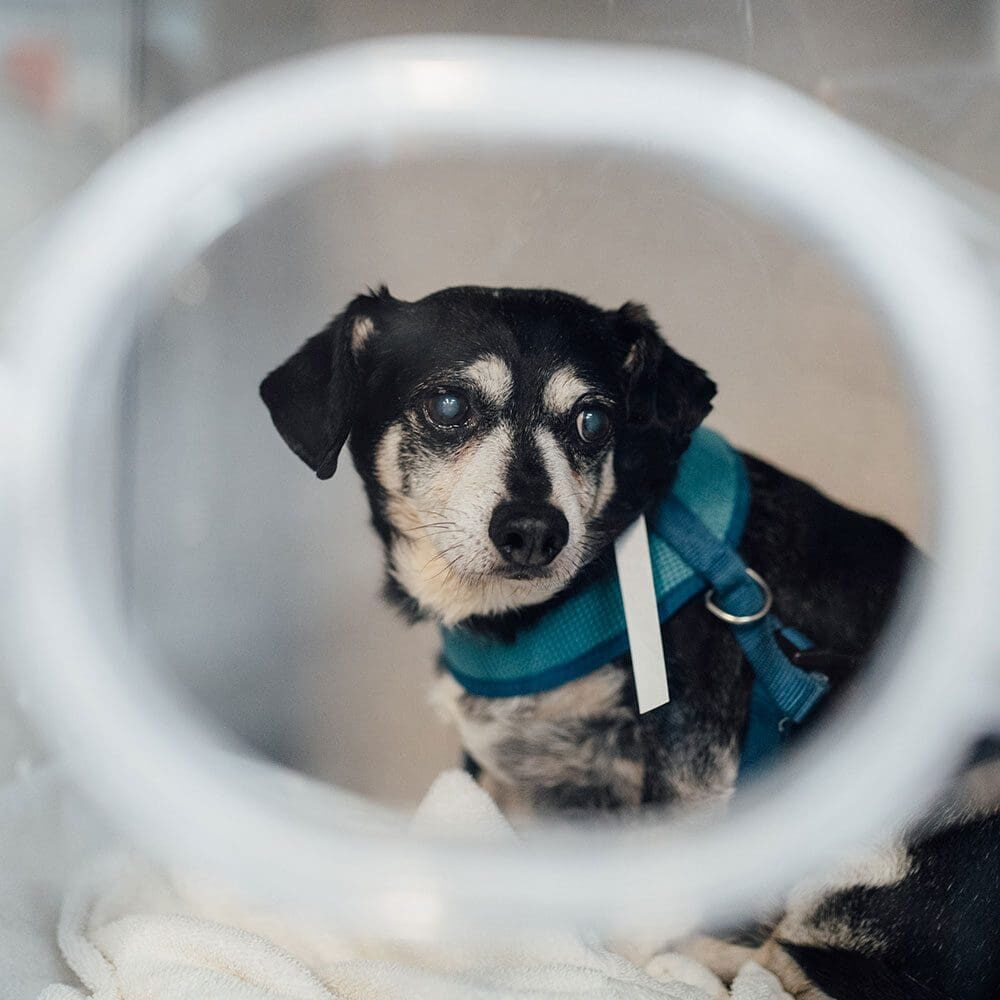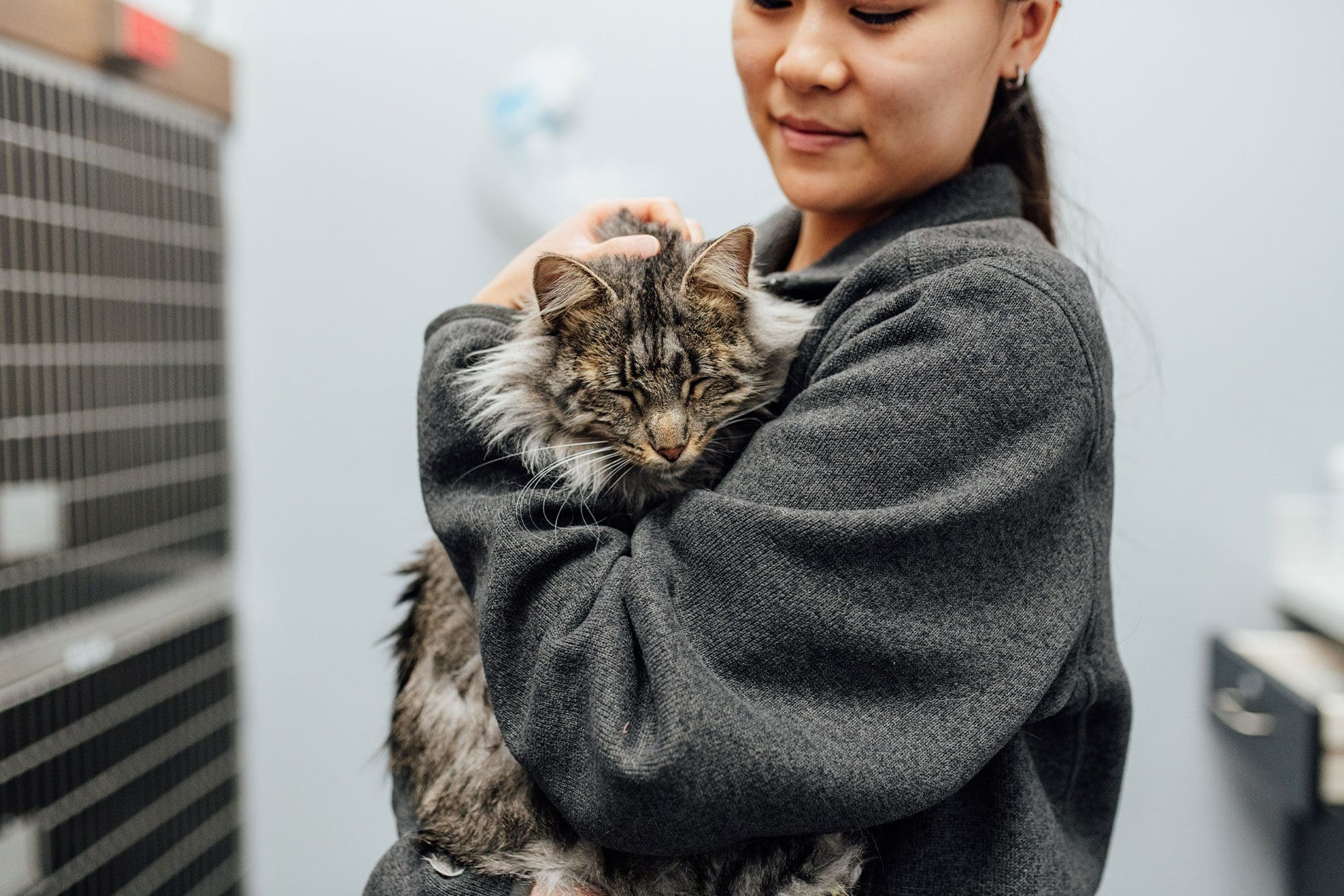Veterinary Specialty Center (VSC), a Certified Trauma Center, is always open to help your pet if they need to see a specialty emergency vet in Bannockburn, IL. Our Emergency and Critical Care Department is open 24 hours a day, 365 days a year to provide emergency care. Similar to human hospitals, our team quickly evaluates cases that present at our hospital to prioritize the most critical patients and begin treatment.
Before coming to the ER, we recommend that you or your primary veterinarian call to discuss your pet’s current medical concern and recent medical history. This helps our team prepare for your arrival. If your pet is having an emergency and does not need to be seen immediately, we also offer the ability to Get in Line for the ER so you can wait in the comfort of your home instead of in your car and receive a text message when it is time to come to our hospital. To see if your pet’s condition qualifies and to register for our Get In Line for the ER service, click here.


What to Expect
Being a VetCot Certified Trauma Center means we can handle all kinds of emergencies, from minor concerns to severe traumas. Along with VetCot Trauma Center Certification, we are one of just seven hospitals worldwide to achieve Level 1 Accreditation from the Veterinary Emergency & Critical Care Society. This ensures our patients get the most advance, life-saving care around-the-clock. VSC is staffed with highly trained criticalists and emergency veterinarians and has a dedicated team of veterinary technician specialists, veterinary technicians, and assistants administering continuous emergency and critical care support.
Upon arrival, our team will examine your pet and discuss diagnostic and treatment options with you. Should your pet need to be hospitalized, our team will closely monitor your pet and keep you updated on their progress. Cases involving life-threatening illness or injury will be managed by our critical care team, which consists of our board-certified criticalists and board-certified emergency and critical care technicians, emergency veterinarians, and ICU technicians and assistants to provide the highest level of critical care.
Emergency and Critical Care Services
Our emergency and critical care teams coordinate treatment with you and your pet’s primary veterinarian while collaborating with our other specialists within VSC.
Some of the more extensive treatment options we have to offer include:
-
24-hour access to advanced imaging such as digital radiography, focused ultrasound, MRI, CT, and fluoroscopy
-
Advanced monitoring including pulse oximetry, capnography, and blood pressure (invasive and non-invasive), and telemetry system for continuous ECG monitoring
-
Advanced multimodal pain management
-
Emergency endoscopy for foreign body retrieval
-
Enteral and parenteral nutritional support
-
Extracorporeal therapies including hemodialysis, plasmapheresis, therapeutic plasma exchange (TPE), apheresis, and peritoneal dialysis
-
Hyperbaric Oxygen Therapy (HBOT)
-
In-house STAT laboratory services such as blood gas monitoring, CBC, blood chemistry analysis, and viscoelastic coagulation testing
-
Long- and short-term mechanical ventilation
-
Transfusion medicine and blood component therapy
Hyperbaric Oxygen Therapy
VSC provides Hyperbaric Oxygen Therapy (HBOT) as an additional treatment option for our patients. HBOT offers several therapeutic benefits, including:
-
Increases oxygen concentration in all body tissues, even with reduced blood flow
-
Improves healing of stubborn wounds
-
Stimulates growth of new blood vessels in areas with poor circulation
-
Increases white blood cell efficiency at killing bacteria
-
Supports control of infections
-
Reduces swelling (edema)
Outpatient Ultrasound
We receive a significant number of walk-in cases requiring ultrasound through our ER department. Due to the high volume, all walk-in ultrasound appointments are seen on a first-come, first-served basis.
Before your arrival, please call our hospital to discuss walk-in ultrasound availability before coming in to avoid a long wait. If your pet is stable and waiting for an ultrasound, you may be asked to return the next day if wait times are extreme.
Walk-in ultrasound patients require a completed ultrasound referral form by their primary care veterinarian, which should be submitted to our hospital before the patient arrives. While we encourage non-urgent pet emergency cases to Get In Line online, walk-in ultrasound cases are not eligible for this service at this time.

